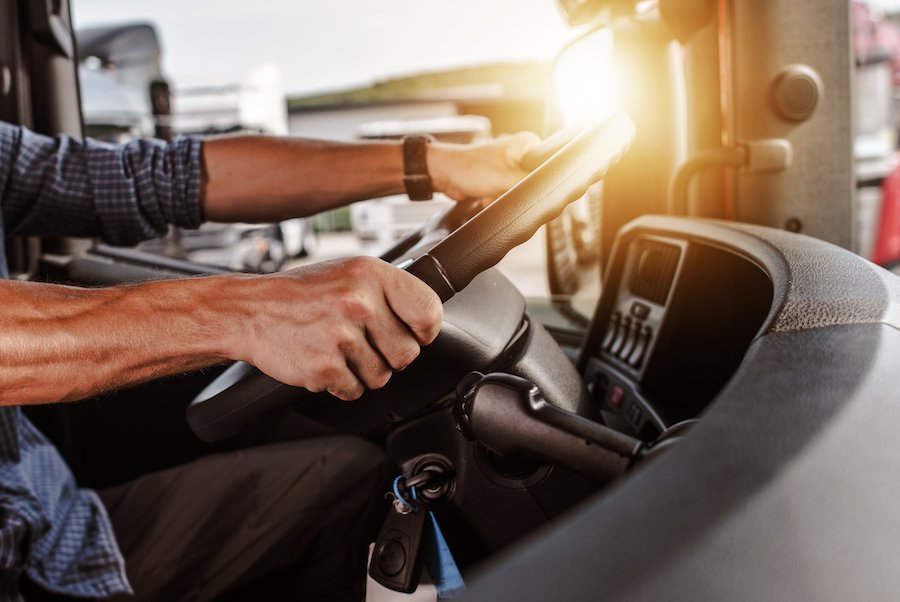Truck and bus drivers in Nevada face commercial DUI charges for driving with a blood alcohol content (BAC) of 0.04% to less than 0.08%. Therefore, commercial drivers are held to stricter drunk driving standards than non-commercial drivers, who may operate motor vehicles with any BAC lower than 0.08% as long as they are not impaired.
A first offense commercial DUI in Nevada is a misdemeanor. The punishment includes 2 days to 6 months in jail or 48 hours to 96 hours of community service, $400 to $1,000 in fines, a victim impact panel, DUI School, a one-year CDL suspension, and a 185-day regular driver’s license suspension.
In this article, our Las Vegas DUI lawyers will explain:
- 1. What is a commercial DUI in Nevada?
- 2. What are commercial vehicles?
- 3. What are the penalties under NRS 484C.120?
- 4. Will I lose my CDL?
- 5. Will I lose my regular driver’s license?
- 6. Can I beat the charges?
1. What is a commercial DUI in Nevada?
Under NRS 484C.120, a commercial driver DUI in Nevada is when a person with a BAC of 0.04% to less than 0.08% is “in actual physical control of a commercial motor vehicle on a highway or on premises to which the public has access.” Non-commercial drivers typically include:
- Bus drivers (including party buses);
- Truck drivers (including Big Rigs and semi-trailer trucks); and
- Shuttle drivers
The 0.04% limit for commercial drivers is half the 0.08% limit for non-commercial drivers.2 Therefore, commercial drivers can be arrested for drunk driving with a 0.07% BAC when a non-commercial driver with the identical BAC would likely go free.
Note that commercial drivers with a BAC of lower than 0.04% could still get arrested for DUI as long as they appear impaired by alcohol or controlled substances.3 And in cases where commercial drivers are not under the influence but do have some alcohol in their system under the 0.04% legal limit, a law enforcement officer may issue them a 24-hour order to stay off the road.
Note that drivers are prohibited from driving a commercial motor vehicle if there is any trace of drugs in their blood.1

NRS 484C.120 makes it a misdemeanor to drive a commercial vehicle with a BAC of 0.04% to less than 0.08%.
2. What are commercial vehicles?
Commercial motor vehicles (CMVs) in Nevada comprise most trucks, buses and shuttles. Specifically, a CMV is any motor vehicle used in commerce to transport passengers or property if the vehicle:
- has a gross combination weight rating of 26,001 or more lbs. (includes a towed unit with a gross vehicle weight rating of over 10,000 lbs.);
- has a gross vehicle weight rating of 26,001 or more lbs.;
- is designed to transport 16 or more passengers including the driver; or
- is used in the transportation of hazardous materials5
3. What are the penalties under NRS 484C.120?
A first offense commercial DUI in Nevada is a misdemeanor. The punishment includes:
- 2 days to 6 months in jail;
- $400 to $1,000 in fines;
- Victim impact panel;
- DUI School;
- 1-year CDL suspension; and
- 185-day suspension of non-commercial driver’s license
A second offense commercial DUI in Nevada (within seven years of the first one) is also a misdemeanor. But the sentence is harsher:
- 10 days to 6 months in jail;
- $750 to $1,000 in fines;
- Victim impact panel;
- DUI School;
- Permanent CDL suspension; and
- 1-year suspension of non-commercial driver’s license
A third offense commercial DUI (within a seven-year period) is a category B felony. The penalty is:
- 1 to 6 years in Nevada State Prison;
- $2,000 to $5,000 in fines; and
- 3-year suspension of non-commercial driver’s license6
Note that a commercial DUI causing injury or death (NRS 484C.430) is also a category B felony. The punishment is:
- 2 to 20 years prison;
- $2,000 to $5,000 in fines, and
- 3-year suspension of non-commercial driver’s license7
Penalties may be as much as doubled if the incident took place in a work zone.8
4. Will I lose my CDL?
In Nevada, a first-time commercial DUI carries a one-year CDL suspension. But if the defendant was transporting hazardous materials at the time, the suspension period lasts for three years. Meanwhile, a second-time commercial DUI causes the defendant’s CDL to be revoked for life. There is no chance for a license reinstatement. This would cause career truck drivers to lose their livelihoods.
Note that CDL-holders face the same suspensions described above even if:
- they get arrested for a non-commercial DUI in a non-commercial vehicle, and/or
- they refuse to submit to a chemical test of their breath or blood following any DUI arrest.9
The only way to avoid a CDL suspension is to win both the criminal DUI case and the administrative DMV case, which are totally separate proceedings. The DMV case consists of a DMV hearing, which is like a mini-trial where the defendant (or his/her attorney) fights the license suspension.
In practice, DMV hearings are difficult to win. Whereas criminal trials require prosecutors to prove guilt beyond a reasonable doubt to get a conviction, the DMV can revoke a person’s license based on hardly any evidence. But DMV trials are still worth doing since they serve as a “dry run” for the criminal case.

A first-time commercial DUI conviction triggers a 1-year CDL suspension.
5. Will I lose my regular license?
Commercial DUI defendants who get their CDL suspended in Nevada also have their non-commercial driver’s license suspended as well. A first-time commercial DUI results in a 185-day non-CDL suspension. A second case triggers a one-year non-CDL suspension. And a third case triggers a three-year non-CDL suspension.
Note that for a first-time DUI offense, defendants may be able to resume driving on their non-commercial license right away if they install an ignition interlock device in their vehicles.10
As discussed in the prior section, commercial DUI defendants may keep both their CDL and non-commercial licenses if they win both the criminal case as well as the DMV hearing. Winning one but losing the other will still cause a license revocation.
6. Can I beat the charges?
Ten common defenses that Nevada drunk driving attorneys use to fight commercial DUI charges are:
- The defendant was not intoxicated but rather exhausted from driving. And the defendant’s tiredness mimicked symptoms of being inebriated or high.
- The automobile was not actually a commercial vehicle.
- The defendant was experiencing a medical episode that resembled being drunk, such as a seizure or diabetic coma.
- The defendant had dental work such as a bridge that may have caused mouth alcohol to pool, causing an inaccurately high breath test result.
- The defendant suffered from acid reflux, auto-brewery syndrome, or another medical condition that caused his/her breath sample to register high blood alcohol concentration levels.
- The police lacked reasonable suspicion to make the initial traffic stop.11
- The police failed to give proper instructions for the field sobriety tests.
- The police had no probable cause to make the arrest.
- The police did not administer the breathalyzer test correctly, or the device was defective.
- The defendant’s blood test samples became contaminated.
Another potential defense is that fumes from the truck or bus seeped into the vehicle, causing the driver to become impaired without his/her knowledge. If the defense attorney can show that this was due to a defect of the vehicle that the defendant had no control over, the prosecutor may be willing to reduce or dismiss the charge.
If the state refuses to dismiss the commercial DUI charge, it may be willing to reduce it to reckless driving (NRS 484B.653) as part of a plea deal. Reckless driving carries only a two-month CDL suspension of driving privileges for a first offense.12 Learn more about how to reduce a DUI to reckless driving in Nevada.

Call our DUI law firm for legal advice. We offer consultations.
Arrested for driving under the influence of alcohol in a commercial vehicle in the state of Nevada? Contact our Las Vegas criminal defense attorneys and DUI attorneys to discuss how we can fight to get your charges lessened or dropped while saving your license.
Legal References
- NRS 484C.120; see also Knipes v. State, (2008) 124 Nev. 927, 192 P.3d 1178, 124 Nev. Adv. Rep. 79. AB 400 (2021).
- NRS 484C.110.
- NRS 484C.120.
- NRS 484C.120.
- NRS 484C.120.
- NRS 484C.400.
- NRS 484C.430.
- NRS 484C.400.
- 49 C.F.R. § 383.51(b)(1) to (4).
- NRS 483.460.
- State v. Rincon, (2006) 122 Nev. 1170, 147 P.3d 233, 122 Nev. Adv. Rep. 99.
- 49 C.F.R. § 383.51(c).

